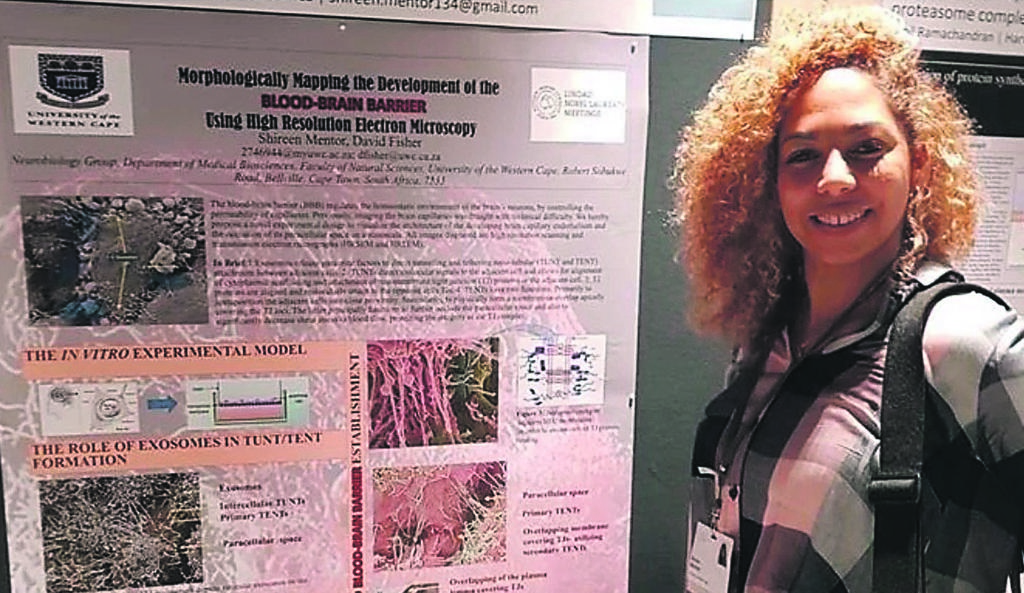
One of the youngest scientists in the country has called for a shift in how the subject is taught at school.
Shireen Mentor, one of six South African female scientists nominated by the Academy of Science of South Africa to attend the 68th Lindau Nobel Laureate Meeting in Germany this July, says the current school curriculum should be restructured to accommodate more women.
Speaking from the US, where she is conducting research as a Fulbright Scholar at the University of Missouri in Columbia, Mentor said the current teaching of science was not good enough to prepare pupils for the future.
“I do not believe the curriculum is designed to make girls envision themselves as scientists,” said Mentor.
“Look at some of the experiments they do in schools, for example, explosions and dropping cannonballs.
"I am not saying the curriculum must be changed or gender stereotypes be corrected, I am just saying that teaching physics should be in a way that accommodates everyone and it should be relatable.
“For example, physics should be taught in a double-dutch perspective and relate it to basic experiences. The context of teaching should be in a way that is more diverse and relatable and this will encourage a lot of girls to be in the science field.”
Mentor’s current project is neurological degeneration, which entails understanding the complex mechanisms of the highly specialised blood-brain barrier.
“I am currently researching the effects of Alzheimer’s disease, which involves the general deterioration of the brain by affecting regions of the brain associated with memory, thinking and behaviour.
"Research of this nature would be important for healthcare worldwide as the blood-brain barrier serves to protect our brain’s microenvironment/brain tissue.
“My study focuses on Alzheimer’s and its effects on the integrity of the blood-brain barrier,” she said.
Alzheimer’s makes up 60% to 80% of all kinds of dementia. In terms of disease prevalence, it affects 44 million people worldwide – 5.7 million in the US and approximately 2.2 million people in South Africa are burdened with the disease.
Born and bred in Montevideo, near Manenberg in the Cape Flats, Mentor was raised by a single mother who was a nursing sister at Groote Schuur Hospital and Mediclinic Constantiaberg.
“Growing up, I was quite an imaginative child; I would say a dreamer for sure. I remember when I was five, my mother took me to the hospital and we went to the lab. I was excited to be in there.
"I was thrilled when she showed me how cells look under a microscope. From there onwards I knew this was what I wanted to do.”
Her experiences growing up in the Cape Flats shaped her research module.
“I was exposed to a lot of substance and alcohol abuse in the Cape Flats, hence I decided to base my research on the effect that substance abuse – methamphetamine in particular – has on the brain and the blood-brain barrier.
"My motivations were purely based on the thing I could see in my surroundings.”
The 29-year-old spoke of struggling to enrol for her desired course and the determination that got her to where she is.
“Getting to university was not easy. My mathematics marks were so low that I could not qualify for the course I initially wanted to do.
"I had to repeat it four times until I was accepted in an extended course at the University of the Western Cape (UWC),” where she hopes to obtain her PhD in Medical Bioscience.
Mentor said the July science conference – where more than 600 of the world’s most intelligent individuals convened, including Nobel prize-winning scientists – was an eye-opener for her.
“When I arrived at the meeting, initially I thought I was going to meet the Nobel laureate and the whole meeting was going to be about science, but it was totally different.
"I had an opportunity to meet Ada Yonath [the first Israeli woman to win the Nobel prize out of 10 Israeli Nobel laureates]. I was star-struck and stunned.
"Instead of just talking about her work, pertaining to the structure of ribosomes, she also spoke at was speaking about everything, herself as a mother and a grandmother.
"She spoke about life in general and this made me realise how strong and powerful women are and their ability to fuse a lot of roles into one.”
TALK TO US
How must the education department restructure the curriculum to best prepare women for careers in science?
SMS us on 35697 using the keyword SCIENCE and tell us what you think. Please include your name and province. SMSes cost R1.50. By participating, you agree to receive occasional marketing material




 Publications
Publications
 Partners
Partners








